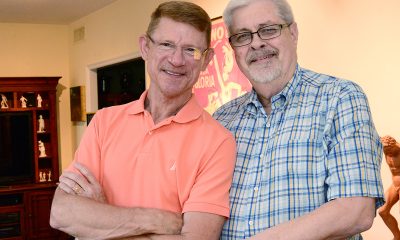Local
Rehoboth’s Clear Space Theatre regroups after commissioners reject new buildings
Opponents say officials failed to submit ‘code compliant’ application
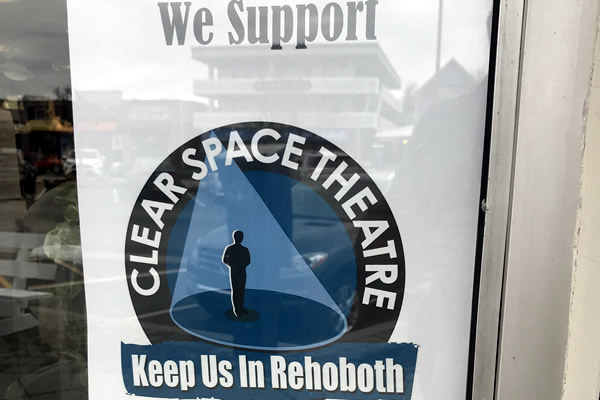
The Rehoboth Beach Board of Commissioners voted for the second time in eight months on June 30 to overturn a decision by the beach resort city’s Planning Commission to approve plans by the Clear Space Theatre Company to build a larger theater and adjacent rehearsal theater in a new location.
Supporters of the theater project, including many of Rehoboth’s LGBTQ residents and summer visitors, expressed outrage over the Board of Commissioners 4 to 3 vote to reject the Planning Commission’s approval and deny the Clear Space application to build its proposed new theaters on Rehoboth Avenue, which serves as the city’s main commercial boulevard.
The four commissioners voting to overturn the theater’s approval were Rehoboth Mayor Stan Mills, gay Commissioner Patrick Gossett, and fellow Commissioners Susan Gay and Jay Lagree. The three who voted against overturning the approval were gay Commissioner Edward Chrzanowski, lesbian Commissioner Pat Coluzzi, and Commissioner Richard Byrne.
The controversial vote to overturn the theater project approval came in response to an official appeal against the Planning Commission’s Feb. 26 approval of the project filed by 63 Rehoboth homeowners or renters, including D.C. gay attorney Harvey Shulman, who owns one of the homes near where the new theater buildings were to be built.
Shulman said at least 15 percent of those who signed on as appellants are gay. He and other opponents have said the two proposed theater buildings — a 14,949-square-foot main theater and a 9,950-square-foot rehearsal theater — are unsuitable in the three lots on Rehoboth Avenue where they were proposed to be built. Opponents say the two theater buildings would abut a residential neighborhood that would suffer undue noise, traffic congestion, and parking problems caused by the theaters.
Clear Space submitted the two-theater building proposal after the Board of Commissioners refused to approve an exception to the zoning code requested by Clear Space for an earlier plan for one larger 25,599-square-foot theater building. City officials noted the zoning code required any building larger than 15,000 square feet to provide 100 or more indoor or onsite parking spaces, which Clear Space said it did not have the financial resources to fulfill.
In a development that angered the opponents, Clear Space submitted a new plan for the two smaller buildings, which under the zoning code does not require Clear Space to provide any parking spaces for the project.
Clear Space has said its site plan would address noise and parking issues and it complies with the city’s zoning code. Others supporting the theater have argued that anyone who chose to buy a home adjacent to a busy commercial street like Rehoboth Avenue should expect to deal with some noise and parking issues, which for years residents of the popular beach resort town have managed to deal with.
The commissioners who voted to overturn the Planning Commission’s approval of the project cited as their main concern the contention by Shulman and the other appellants that the Planning Commission approved the project without ever having received or seen a code-complaint application, including a code-compliant set of drawings or plans for the project. The appellants said the Planning Commission allegedly only had in its possession an earlier application that was not in compliance with the city’s zoning code.
Wesley Paulson, executive director of Clear Space Theatre Company, and Commissioner Chrzanowski each told the Washington Blade that the Planning Commission was informed by the city’s building inspector that the Clear Space application and building site plans fully complied with all city codes.
The two pointed out that the building inspector, in consultation with the Planning Commission, set several conditions based on an earlier Clear Space application that had a minor code violation related to ceiling heights in one or more stair wells that should be corrected. Paulson and Chrzanowski pointed out that those changes were made.
Chrzanowski said he and his fellow commissioners who voted against overturning the project’s approval strongly disagree with the rationale by Mills, who serves as mayor, and the other three commissioners that the Planning Commission acted in an “arbitrary and capricious” manner in its decision to approve the theater’s application.
“It is my opinion that they were not acting any way in that fashion,” Chrzanowski said of the Planning Commission. “The fact of the matter is these appellants, they don’t care whether or not a drop ceiling in a stairwell needed to be reduced by six inches or not,” he said.
“They just oppose the project because they don’t want it in their back yard,” he told the Blade. “It has nothing to do with a process or a code. They just don’t want it in town, and it’s unfortunate.”
Shulman disputes that claim, saying existing Rehoboth law requires that the Planning Commission could not legally approve an application that never came before it and never became available to the public for review.
“This is not a question of whether you like the theater or you don’t like the theater,” he said. “There is a process that has to be followed. And the public has a right to have input. And that didn’t happen here.”
Among the Clear Space supporters who have criticized the Board of Commissioners who voted against the theater is longtime D.C. LGBTQ rights advocate Peter Rosenstein, who has a residence just outside the Rehoboth city boundary. Among other things, Rosenstein dismisses Shulman’s claim that a significant number of gay residents wanted the Board of Commissioners to overturn the theater’s approval.
“He’s got 20 gays that don’t support it and there are 3,000 that support it,” said Rosenstein. “They can find any excuse they want,” Rosenstein said in response to claims that the Planning Commission never received the theater’s final, revised application.
“The Planning Commission didn’t make any mistake,” he said. “The theater was code compliant. They met every condition the Planning Commission wanted. Technicality or not, they were going to find an excuse to turn it down.”
Paulson, the Clear Space executive director, said he remains hopeful that Clear Space will be allowed to resubmit its final, fully code complaint application to the Planning Commission for another quick and legally mandated approval without having to start the application process over again from scratch.
Supporters say starting over could take six months or more to obtain another round of approval from multiple city agencies and inspectors, a process that would add to Clear Space’s financial burden. They note that the application process has already taken three years since Clear Space first proposed to move from its current location in a rented former church on Baltimore Avenue near the city’s boardwalk.
Paulson said another option under consideration is to take the matter to court in a lawsuit to challenge the legality of the Board of Commissioners action. But he said he would prefer not to take that action if another option becomes available.
Paulson points to Board of Commissioners member Susan Gay, who voted to overturn the Planning Commission’s approval of the project but who stated in an interview on a Rehoboth radio show the day following the Board of Commissioners’ vote that she didn’t believe the theater would have to begin a new application process.
“So, Susan, do they have to go back and start this process all over like a six-month plan again,” Radio Rehoboth talk show host Jeff Balk asked Gay in an early morning interview on July 1.
“No,” Gay replied. “So, part of Plan B is they can submit code compliant plans today,” she said. “I understand they do exist. If that’s the case, submit them. And at that point, I would hope the Planning Commission would expeditiously review it in compliance with the site plan review and it would result in a unanimous approval,” Gay said in the radio interview.
But both Chrzanowski, who wanted the city to approve the theater’s application, and Shulman, one of the lead opponents, each said that under existing Rehoboth law, a project like this must start the application process over again from scratch if it has been rejected twice by the Board of Commissioners.
“When you reject a decision by the Planning Commission for a second time, it’s dead,” Chrzanowski told the Blade. “You need to start from scratch,” he said. “There may be an administrative thing the city could do to help move it along faster, but that certainly is not Commissioner Gay’s decision,” he said. “So, she very much misspoke when she made those statements.”
Shulman told the Blade that if Clear Space chooses to start the application process over again, he believes the opponents of the project would be open to favorably consider the new application.
“If they come back with a new application, everyone will see whether it is code compliant,” he said. “I believe and the opponents have always said this – we will sit down with Donna West, who is the chair of the [Clear Space Theatre Company] board, and try to reach some agreement on what a code compliant application would be, so there is no opposition or, so the opposition is minimized.”
World Pride 2025
WorldPride conference speaker unable to travel to D.C. after visa waiver program eligibility revoked
UK Black Pride co-founder Phyll Opoku-Gyimah visited Cuba earlier this year
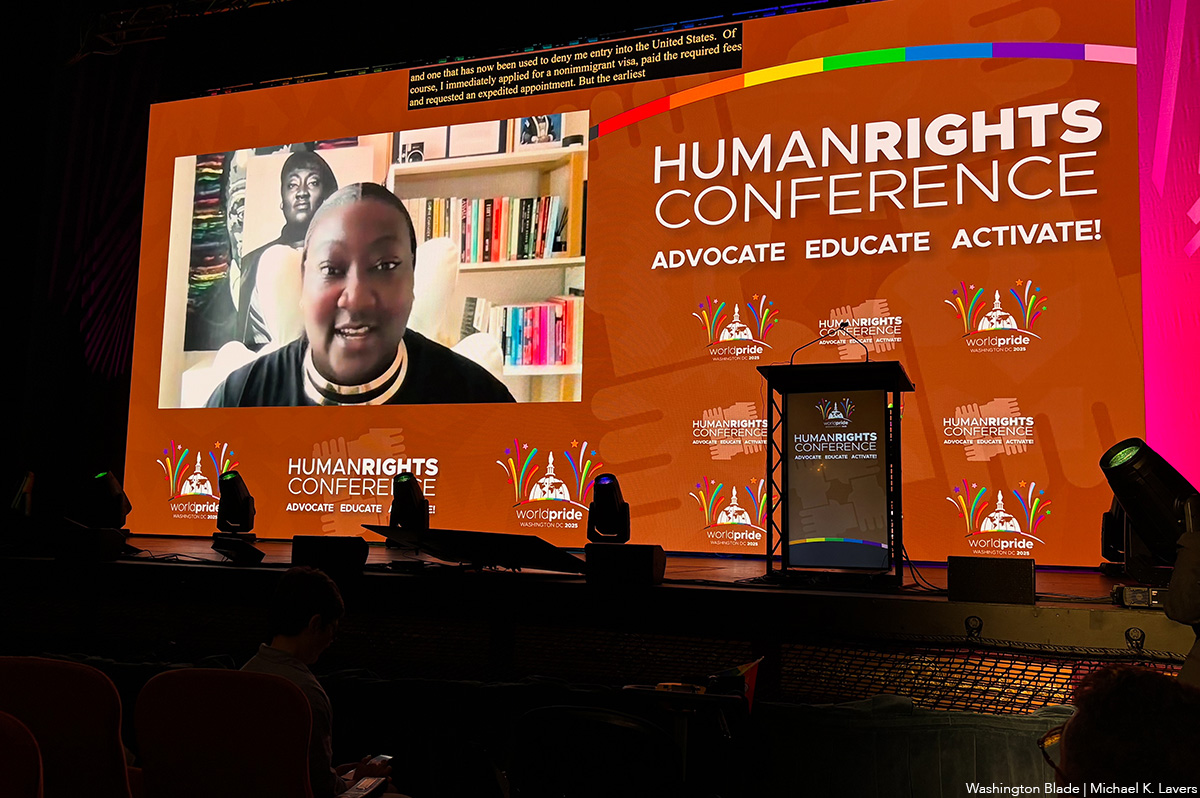
A prominent LGBTQ activist who lives in the U.K. said she could not travel to D.C. for the WorldPride 2025 Human Rights Conference because the U.S. revoked her eligibility to enter the country without a visa.
Phyll Opoku-Gyimah, the co-founder of UK Black Pride known as Lady Phyll, was supposed to speak at the conference’s opening plenary at the National Theater. Opoku-Gyimah instead spoke remotely.
She said the U.S. “revoked” her eligibility to participate in the Visa Waiver Program and use an Electronic System for Travel Authorization, or ESTA, to enter the country without a visa because she traveled to Cuba earlier this year.
The U.S. Customs and Border Protection website notes the State Department on Jan. 12, 2021, designated Cuba as a state sponsor of terrorism.
President Donald Trump’s first administration ended eight days after he made the designation. Then-President Joe Biden in the final days of his administration said the U.S. would move to lift the designation as part of a Vatican-brokered deal that secured the release of prisoners on the Communist island. Brenda Díaz, a transgender woman with HIV who participated in an anti-government protest in 2021, is among those who the Cuban government released from prison.
The CBP website notes that with “limited exceptions, a traveler who is found to have visited Cuba on or after this date is not eligible for travel under the Visa Waiver Program (VWP) using an Electronic System for Travel Authorization (ESTA) and must apply for a visa to travel to the United States.”
“Additionally, a traveler who at the time of application for an ESTA holds dual nationality with both a VWP country and Cuba is not eligible for travel under the VWP using an ESTA and must apply for a visa to travel to the United States,” it reads. “If an ESTA has already been approved and it is later determined that the traveler has been present in Cuba or holds dual nationality with both a VWP country and Cuba, the ESTA will be revoked.”
“Ineligibility for an ESTA is not a bar to travel to the United States,” notes the CBP website. “Individuals who are not eligible to travel under the VWP may apply for a visa at any U.S. embassy or consulate.”
Opoku-Gyimah said she learned of the revocation “as I preparing to be with you.” Opoku-Gyimah in her remarks said she applied for a visa that would have allowed her to enter the U.S., but the first available appointment was not until later this year.
“Yet from afar, I’m here,” she said. “We don’t abandon our people.”
The Department of Homeland Security, which oversees CBP, has yet to respond to the Washington Blade’s request for comment.
District of Columbia
D.C. church removes Pride decorations from house rented to gay tenants
Agent said display of Pride flags violates lease
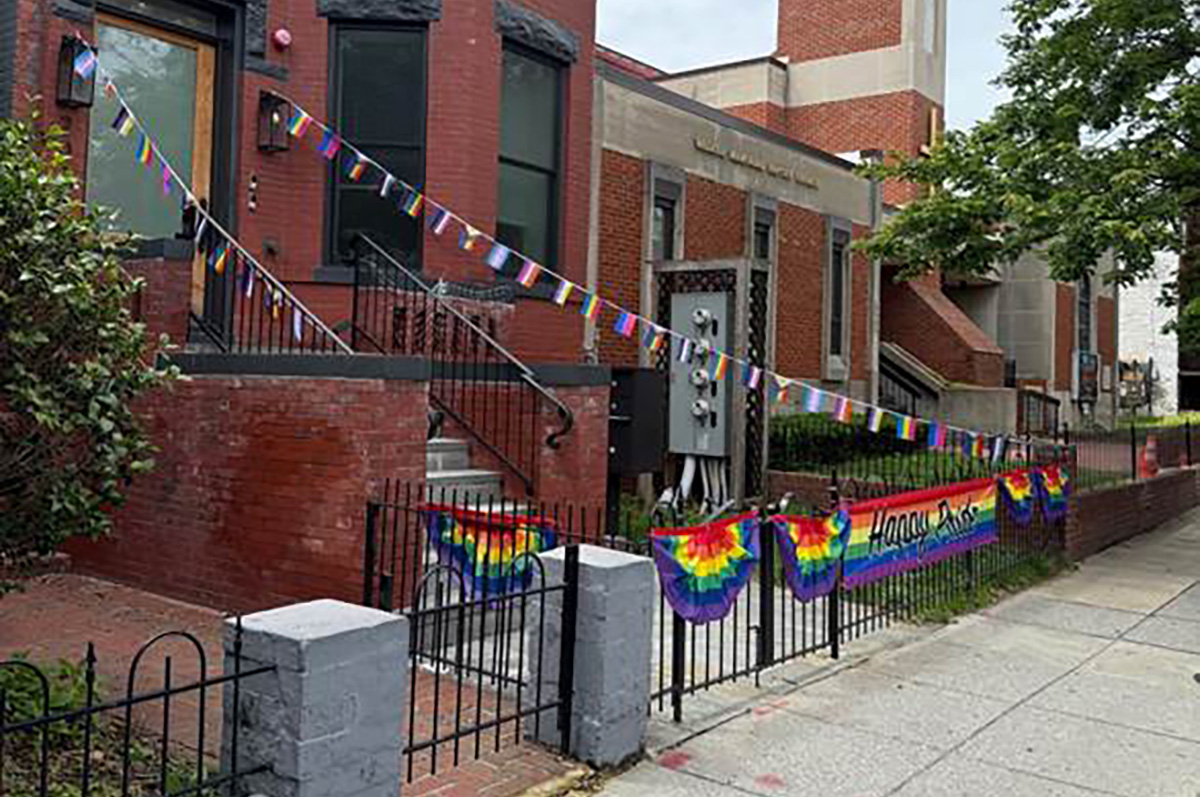
D.C.’s Walker Memorial Baptist Church located on 13th Street, N.W., just off U Street had one of its workers on June 3 remove an arrangement of Pride flags and banners displayed on the front fence of a townhouse the church owns that were put up by a gay couple who rent an apartment in the house.
Jay Richards, who along with his partner lives in a rented apartment at the house at 2014 13th Street, N.W., said he was contacted by a rental agency working for the church a few hours after he put up the decorations on May 30 asking that the decorations be taken down.
The church is located next door to the townhouse, which has three apartments that are rented to tenants, including Richards and his partner. Richards said the tenants in the other two apartments were fully supportive of the Pride decorations.
“We kindly ask that any decorations or items be removed by Tuesday, June 3, 2025, at 1:00 p.m.,” a follow-up message sent to Richards by the rental agency says. “If items are still in place after this time, our team will remove them, and please note that a fee may apply for this service,” the message said.
Richards said the rental company, EJF Real Estate Services, pointed to a provision in his apartment’s rental lease that does not allow exterior decorations to be placed on or in front of the house. He said he asked if an exception could be made to allow him to keep the Pride decorations up until Monday, June 9, the day after WorldPride 2025, ends on Sunday, June 8.
In a statement released this week to the online publication DC News Now, EJF said it was proud to support the LGBTQ community and decided to allow the tenants to keep the decorations up until June 9 as requested by Richards.
“While we remain mindful of our responsibility to both the lease and our client, we believe this is a respectful and reasonable approach,” the statement says. “EJF will not be removing the decorations ourselves and is honoring the residents’ plan, trusting they will follow through as promised,” DC News Now quotes the statement as saying.
Richards told the Washington Blade he was hopeful that the church would also allow the decorations to remain up through the end of the WorldPride festivities. “I wanted to leave them up all month for Pride month,” he said. “But we were willing to take them down on Monday, after Pride weekend.”
Much to his disappointment, Richards said the church’s custodian early Tuesday evening, May 3, came to the house and pulled down the decorations and left them next to the front steps of the house.
A photo that Richards provided for the Blade taken before they were taken down shows the decorations included several rainbow flags and banners draped over an iron fence in front of the house and two long ropes extending from the front wall of the house to the fence on which multiple small rainbow flags were suspended.
Rev. Ademuyiwa T. Bamiduro, the pastor of Walker Memorial Baptist Church, did not immediately respond to a phone message left for him by the Blade seeking comment from the church about the removal of the Pride decorations.
Richards said he and the other tenants in the house received an email message from the church Tuesday night, June 3, shortly after the decorations were removed explaining why they were taken down, which he provided to the Blade.
“Decorations on the outside of the property or common areas regardless of the event, holiday, season, occasion, or reason violate the lease terms,” the message states.
“This is not about subject matter,” the message says. “The mission of Walker Memorial Baptist Church is a prayerful congregation, walking in the spirit, bringing souls to Christ. That is our focus. We seek unity, not division, through our lease requirement that there be no decorations on the outside of the property or common areas,” the message continues.
“In doing so, we avoid arbitrary decision-making and the need to distinguish between the content or subject matter of any decorations,” it states.
Local LGBTQ rights attorney Mindy Daniels, when told by the Blade of the content of the lease in question, which bans external decorations, said it appears that the church is within its legal rights to not allow those decorations.
Daniels said the church could be in violation of the D.C. Human Rights Act, which bans discrimination based on sexual orientation and gender identity, among other categories, if it were to make an exception and not enforce its lease requirements for some types of decorations while enforcing them for others such as Pride flags.
“The email they sent me said we can’t put decorations up for any holidays,” Richards told the Blade. “But I do feel like if I had put something up for the holidays for Christmas that they wouldn’t have taken it down. But now they’re saying that no decorations can be put up.”
Baltimore
Baltimore Pride plans to ‘take action’ in annual Pride festival
‘None of us should be sitting back and waiting for someone to come and save us’

As Baltimore Pride celebrates 50 years of LGBTQ history in their “50 Shades of Pride” events from June 9-15, they’re focused on mobilizing and taking action.
“When we think back to the history of Baltimore Pride, it is one of the most central pride movements of LGBT and black liberation, and so this year will be very different,” FreeState Justice Advocacy, Policy, and Partnerships Director Ronnie Taylor said. “In a time where federally, we are under attack and dealing with so much, I think this will be a really amazing way for our federal, state, and local individuals to be able to come together and be amongst the community we serve.”
Taylor said she’s excited to be part of the events leading up to the Baltimore Pride Parade that showcase the LGBTQ community. She said celebrating 50 years of history is a way for her to pay homage to her “transcestors” and ancestors who fought hard in Baltimore and Maryland to ensure equality for all.
“For me, personally, acknowledging, and celebrating 50 Years of Baltimore pride is monumental,” Taylor said. “And knowing that we’ve only taken two years off based on COVID-19 mandates to be able to come together … is going to be really monumental.”
For Taylor, one of her personal goals for the “50 Shades of Pride” celebration in upcoming years is to have a summit or conference where Pride is not just acknowledged, but talked about regarding policies and safety agendas.
“We need to be able to have a space to talk about legislation, and we need to be able to have a space for all to feel like (the LGBTQ community) is included in their decision-making process on the federal, state, and city-wide level,” Taylor said. “And so this will be a way for our elected officials to be able to come together and hear from community members.”
Taylor added that mobilization and activation in the community are needed now more than ever.
“We see it on a federal level. We are not protected right now in what we have,” Taylor said. “All we have is each other. And you know, none of us should be sitting back and waiting for someone to come and save us, as we are the saviors of ourselves.”
Taylor said having a space to “break bread” and party in the streets to celebrate Pride is amazing, but Pride organizations’ initiatives go beyond that.
FreeState Justice and the Pride Center of Maryland have created a trans advocacy care initiative that will be released and marketed to engage with community members throughout Baltimore’s Pride festival, according to Taylor.
“We have to stop moving in cycles,” Taylor said. “(When) we’re talking about community work and mobilization and activation … we wouldn’t be here with it without it being for each other. Overall, collectively, let’s do the work and get it done.”
-

 The White House1 day ago
The White House1 day agoWhite House has ‘no plans’ to recognize Pride month
-

 District of Columbia3 days ago
District of Columbia3 days agoMayor Bowser hosts WorldPride welcome event after Shakira cancels
-
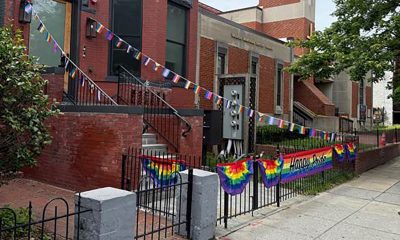
 District of Columbia6 hours ago
District of Columbia6 hours agoD.C. church removes Pride decorations from house rented to gay tenants
-
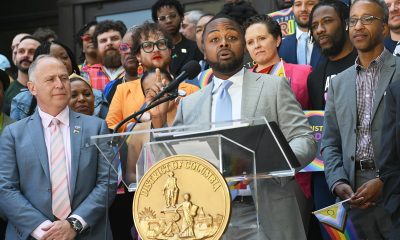
 District of Columbia2 days ago
District of Columbia2 days agoD.C. police chief rescinds request to close Dupont Circle Park for WorldPride

